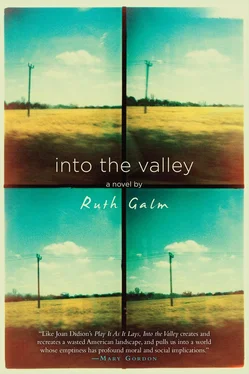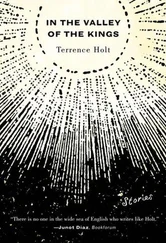The girl was examining her various profiles in the mirror. “He’ll ask me now, Trudy,” she said. “It’s for sure.”
“I don’t see why not,” the hairdresser responded, but her tone was noncommittal, as if she had visited this conversation before and used up the requisite energy.
“His daddy’ll just have to park it,” the girl went on, biting her thumbnail in between sentences, still glancing sidelong at her reflection. Then she turned straight on in the mirror. “I’m tired of all the judgments, you know? Sick and tired.” The thumbnail went back into her mouth.
“We’ll fix you up, hon,” the hairdresser said without enthusiasm.
“I like your dress,” the girl said abruptly to B.
“Thank you.”
“It’s from the city, I can tell. Couldn’t be from around here. Maybe I’ll go to the city for my wedding dress. I’m getting engaged tonight.”
The girl turned back to the hairdresser, making pouty lips into the mirror. “Listen, Trudy, I need you to pull out all the stops this time. Totally bitchin’, okay?”
The girl’s clouded eyes began to haunt B. It was too hard to make out what was behind them. B. rubbed her hands together nervously.
“We do nails, too,” the hairdresser said listlessly.
B. glanced down at the rutted pink polish and dug her nails into her lap. “That’s alright.”
“I’d like to move to the city,” the girl said, turning to B. again. “Have our own apartment there. Robby could work in a skyscraper or something. My best friend Debbie was all set to go — you know Deb, don’tcha Trudy? — but she got married last summer and she’s already full up with diapers.”
“I’m not afraid of the city,” the girl added. “My mom thinks it’s all druggies and pervs, but I think it’d be boss. Anything to get outta here.”
“Oh, well if you want to know anything,” B. offered, “I can tell you—”
“—I mean, Robby is going into the Air Force first, and so we’ll probably have a house at McClellan to start, but then after he has his pilot’s license, we’ll go then. .” Her voice drifted off.
B. did not know why it mattered to her if the girl went to the city or not. And yet she felt betrayed, as if the girl were stranding her by not going to the city. “There are nice beauty parlors in the city,” B. murmured. “You might really like them.”
“Thing is, it all depends on Mr. Robert R. Taylor senior . What a candyass. But he has the money, so it all depends on what he says. I just hope he gets the golf club for the reception. I just hope he’s not too candyass to do that.” The girl’s eyes were a terrifying smear now, irises and pupils lost in the blue powder and black liner, no reflection at all, calculating opaquely about the golf club for the reception.
“He likes it down, but it’s got to be classy. You know, memorable.” The girl gnawed on the thumbnail. “Trudes, do you think maybe an updo? Oh, God, if they photograph us at the restaurant, I want a good picture. I want a damn good picture in the paper.”
“So you ready for me now?” The girl’s bruised eyes pleading. “Trudy?”
The spinning and tightness vibrated in B.’s teeth. She reached for a bank bill to pay and get out and for the first time felt reluctant to part with the money, as if it pulsed out the calm and relief of the banks itself. She forced herself to lay it down on the counter.
The hairdresser did not even notice. The girl was still pleading with her. “God knows I’ve waited — right, Trudy? No one’s waited as long as I have.”
B. hurried out of the salon. At the end of the block she went into a columned stone building and came out again. She put the three hundred dollars in her purse. The plaguing voice vanished. She left the windows down in the Mustang and let her new curls fly.
The next town B. came on was the largest she’d seen in the valley. She avoided for a while anything but the fields, driving straight through the flat green and the flat yellow, concentrating on the line in the road. The town appeared from out of nowhere, like an oasis. (Or was she farther south in the valley than she’d thought? She was no longer exactly sure where she was.) The milky blue sky beat down on its empty streets. A few tall palms listed over the main drag, a movie theater with missing letters in its marquee and a church and a Woolworth’s. A sign pointed toward a river, the existence of which seemed doubtful in the heat.
She turned down the streets until she came accidentally into a neighborhood. A collection of small one-story cottages. Each yard seemed carefully planted, with gladioli and rose bushes, geraniums and fuchsia. Actual trees, a rare collection, stooped over the houses. There was a quietness about the place. Everything seemed quaint and tidy and protected. She parked the car and got out.
She walked up the block. At a cream-colored stucco house she walked up to the arched window. The entire living room was visible. She stood in the shade of a magnolia tree and peered in at a dark green couch and dark green armchair, both decorated with antimacassars at the heads and arms. In the corner of the room a black-and-white television was on. On the dark dining room table she could see a stack of envelopes and a thick book whose title she could not make out. There was a large crucifix in the center of one wall, two small ceramic angels around it. She waited to discern something, some message or communication from these choices, this arrangement. The beauty parlor girl’s blue-and-black smears and the old thin woman’s mottled hands flashed at her. She moved to a different part of the window and continued to watch.
B. waited for someone to come into the front room. For a split second she saw her reflection in the window, the curls wind-ragged, her shoulders pink. The reflection seemed far away; it was the image of a disheveled thin woman. She waited for someone to turn off the television and its flickering gray images. No one came.
She stood there she was not sure how long until she noticed a different reflection. A mailman watching from across the street. She raised her hand to wave. He did not wave back.
Finally she walked back to the Mustang. She sat at the wheel. The television images from the stucco house flitted in front of her: a woman with a box of laundry detergent; a man with a briefcase; a woman in an evening dress. She tried to put these images together in illustration of something, a code to the house, to its way of life.
She did not notice the police officer until he was knocking on the window. The sun was angled low behind him, blurring his outline. She rolled the window down.
“Oh, I’m sorry,” she said. “Is there something wrong?”
“Do you have a license, ma’am?”
“Of course.” She reached over to her purse on the passenger seat. There was a stain from the ice cream on the floorboard; she hoped the police officer could not see it. She drew out her wallet, trying not to open the purse too wide to reveal the fifty-dollar bills.
“I was just feeling tired. They say it’s better not to drive when you’re tired.”
He studied her license. Her face flushed; how closely would he look at it? His fingers around it were large and ruddy, big blond hair follicles in the knuckles. He stooped to her eye level, elbow in the door.
“You’re a ways from the city.”
She made herself observe his badge, his holster. “I’m meeting a friend in Reno, and I was just stopping to do an errand and I wanted to see the neighborhood, and. . it’s such a nice-seeming neighborhood. . then I realized I was a little tired.”
He peered down at the license again, then at her. He could not, she reminded herself, know about the checkbook. Or the bills. Then she realized from the way his gaze returned to her and darted shyly over her face that he was finding her attractive. She had learned she must respond to these cues, that to do so put her at an advantage in a situation.
Читать дальше










